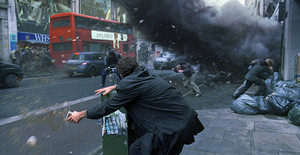Hedwig and the Angry Inch and Plato’s Symposium
(Part of the Misunderstood Blog-a-thon.) I did something I’ve never done before. I’ve been an avid (rabid?) movie fan since I was too young to remember. Even today it’s a rare day that I don’t watch at least two movies, more on weekends. But I have never, never (my inner drama queen insists I repeat this for emphasis) watched a movie and immediately turned around and watched it again from the beginning, all in one sitting.

 In
In 